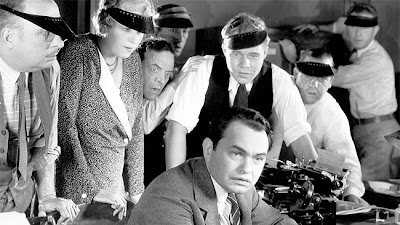I know Eve Tushnet likes to think of Edward G. Robinson’s character in Five Star Final as the cinematic avatar of self-loathing tabloid journalism, and I can see her point. It’s a good script, and it’s Edward G. Robinson. But if we follow the scent of our story back to Late Night Final the play, on which the film was based, and then to Louis Weitzenkorn the playwright, we discover that his experience as a newspaper editor was not exactly representative.
At the New York Evening Graphic , where Weitzenkorn was managing editor, the most pressing dilemma was not how to boost circulation without losing your soul. It was how to work for a publisher who was certifiably insane.
The owner of the Graphic was Bernarr Macfadden, who started out as a strongman and fitness guru. After a few spins on the vaudeville circuit as “The Most Perfectly Developed Man in the World,” he started sponsoring body contests of his own, where he discovered Charles Atlas and, in the winner of his “Most Perfect Specimen of English Womanhood” competition, the second Mrs. Macfadden (who was 26 years his junior). He founded several utopian communes (“healthatoriums”) modeled after Dr. Kellogg’s Battle Creek Sanitarium and no less cultish. His first real moneymaker was Physical Culture magazine, which became popular not so much for its editorials against caffeine, white flour, eyeglasses, and the medical profession (a.k.a. “the medical monopoly” or “the Pus Trust”), but for its many photographs of nude women. In 1948, Macfadden ran for governor of Florida on a physical-fitness platform.
Here’s just one example of the special hell to which this demented health nut subjected his editors: Macfadden raised his eight children according to his eccentric principles, so when his eleven-month-old son Billy had a seizure one night, he ignored his wife’s pleas for a doctor and insisted that a simple hot bath would do the trick. The boy died a few hours later. Macfadden felt he owed his readers an explanation for such an evident failure of his methods, especially since his eugenic offspring had appeared in Physical Culture so often, so he put the whole sad story into an editorial. It essentially blamed Billy’s death on his mother:
Billy was often over-fed . . . I protested on numerous occasions . . . but my protest was not vigorous enough. Anyway, I believed the boy was so strong that he would overcome mistakes of that nature. And it is so hard to combat the tendencies of mother love . . . . I also somewhat blame myself for neglecting his exercises.
It appeared in the following issue of Physical Culture , over his editor’s strong objections. (Someone ought to make a movie of out of that .)
There are definite traces of Macfadden in the publisher character in Five Star Final , like the line “I think we can raise sex to a dignified attitude” (Edward G. Robinson’s response: “What, by another constitutional amendment?”) and his insistence that reporters highlight “the moral values of the story.” I’m not saying that Five Star Final shouldn’t be Eve’s 43rd favorite film of all time, and I’m certainly not saying that running a scandal-crazy tabloid can’t be morally corrupting like it is for Edward G. Robinson. I’m just saying that the ethical disorientation on which the play was based must have been exponentially greater than the average editor’s, given that the author’s boss was a certifiable lunatic.

